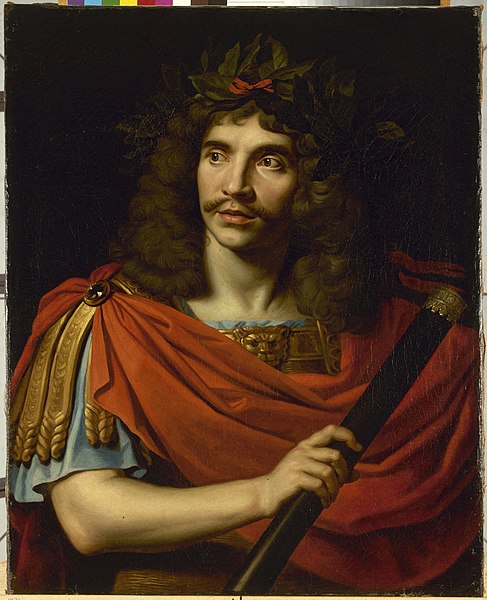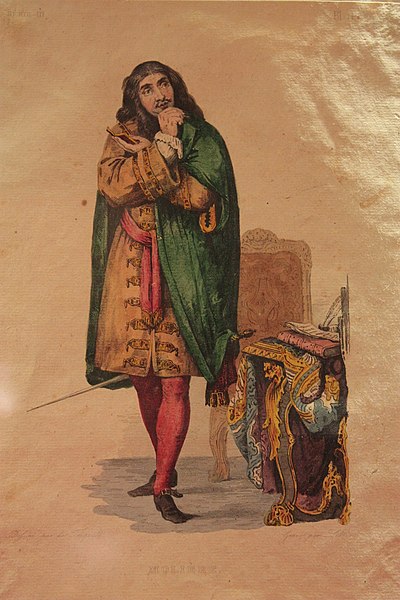
This year marks the 400th anniversary of Jean-Baptiste Poquelin, known as Molière, a French playwright considered one of the masters of comic satire. Since the subjects of his satire ranged from medicine and law to general education, Thammasat University students in many different fields many be interested in his works.
The Thammasat University Library collection includes several books by and about Molière.
Lytton Strachey’s Landmarks in French literature notes:
In the literature of France, Molière occupies the same kind of position as Cervantes in that of Spain, Dante in that of Italy, and Shakespeare in that of England. His glory is more than national, it is universal. Gathering within the plenitude of his genius the widest and the profoundest characteristics of his race, he has risen above the boundaries of place and language and tradition into a large dominion over the hearts of all mankind. To the world outside France he alone, in undisputed eminence, speaks with the authentic voice of France herself. That this is so is owing mainly, of course, to the power of his genius; but it is also owing, in some degree, to the particular form which his genius took…He is so absolute, so special a product of French genius, that it is well-nigh impossible for any one not born a Frenchman to appreciate him to the full; it is by his incompleteness, and to some extent even by his imperfections, that Molière gains. Of all the great French classics, he is the least classical. His fluid mind overflowed the mould he worked in. His art, sweeping over the whole range of comic emotions, from the wildest buffoonery to the grimmest satire and the subtlest wit, touched life too closely and too often to attain to that flawless beauty to which it seems to aspire. He lacked the precision of form which is the mark of the consummate artist; he was sometimes tentative and ambiguous, often careless; the structure of some of his finest works was perfunctorily thrown together ; the envelope of his thought his language was by no means faultless, his verse often coming near to prose, and his prose sometimes aping the rhythm of verse. In fact, it is not surprising that to the rigid classicists of the eighteenth century this Colossus had feet of clay. But, after all, even clay has a merit of its own: it is the substance of the common earth. That substance, entering into the composition of Molière, gave him his broad-based solidity, and brought him into kinship with the wide humanity of the world. It was on this side that his work was profoundly influenced by the circumstances of his life. Molière never knew the leisure, the seclusion, the freedom from external cares, without which it is hardly possible for art to mature to perfection; he passed his existence in the thick of the battle, and he died as he had lived in the harness of the professional entertainer. His early years were spent amid the rough and sordid surroundings of a travelling provincial company, of which he became the manager and the principal actor, and for which he composed his first plays. He matured late. It was not till he was thirty-seven that he produced The Affected Ladies, his first work of genius; and it was not till three years later that he came into the full possession of his powers with The School for Wives. All his masterpieces were written in the ten years that followed (1662-73). During that period the patronage of the king gave him an assured position; he became a celebrity at Paris and Versailles; he was a successful man. Yet, even during these years of prosperity, he was far from being free from troubles. He was obliged to struggle incessantly against the intrigues of his enemies, among whom the ecclesiastical authorities were the mostferocious ; and even the favour of Louis had its drawbacks, for it involved a constant expenditure of energy upon the frivolous and temporary entertainments of the Court. In addition, he was unhappy in his private life. Unlike Shakespeare, with whom his career offers many analogies, he never lived to reap the quiet benefit of his work, for he died in the midst of it, at the age of fifty-one, after a performance in the title-role of his own Imaginary Invalid.
What he had achieved was, in the first place, the creation of French Comedy. Before him, there had been boisterous farces, conventional comedies of intrigue borrowed from the Italian, and extravagant pieces of adventure and burlesque cast in the Spanish mould…It was he who first completely discovered the aesthetic possibilities that lay in the ordinary life of every day. He was the most unromantic of writers a realist to the core; and he understood that the true subject of comedy was to be found in the actual facts of human society in the affectations of fools, the absurdities of cranks, the stupidities of dupes, the audacities of impostors, the humours and the follies of family life. And, like all great originators, his influence has been immense. At one blow, he established Comedy in its true position and laid down the lines on which it was to develop for the next two hundred years. At the present day, all over Europe, the main characteristics of the average play may be traced straight back to their source in the dominating genius of Molière.

There has been some research in Thailand about Molière, such as an article published in 2020, The oratory ethos of Chrysale in Molière’s Femmes savantes by Passakorn Tongvijid, Faculty of Arts, Chulalongkorn University.
Here is the article’s abstract:
In Molière’s Femmes savantes, there is a dichotomy concerning the image of an ideal woman. The camp of learned ladies, such Philaminte and Bélise (Chrysale’s wife and sister), want to promote the intellectual aspect of women while Chrysale pleads for the duty of women toward their families. This ideological conflict turns into a verbal conflict as the characters use their rhetorical techniques to defend their points of view and attack opposing arguments. This article aims to study the oratory ethos and the rhetorical, argumentative and stylistic techniques of Chrysale who seeks to support common sense and the notion of women’s duty. Regarded by his family as a weak-willed man, Chrysale’s preliminary ethos is characterized by weakness and lack of authority. But, the fact that he puts his speech in order, and that he uses various types of arguments and rhetorical figures, reflects a sexist ideology about women that emerges in his discursive ethos and also reflects his desire to restore order in the house. Therefore, he fails to convince the learned ladies to adopt his points of view.
And here are some celebrated lines from plays by Molière:
We die only once, and for such a long time!
- Le Dépit Amoureux (1656), Act V
A witty woman is a devil at intrigue.
- School for Wives (1662), Act III
Nearly all people die of their remedies, and not of their illnesses.
- The Imaginary Invalid (1673), Act III
Doubts are more cruel than the worst of truths.
- The Misanthrope, Act III
Anyone may be an honorable man, and yet write verse badly.
The Misanthrope, Act IV
- An educated fool is more foolish than an ignorant one.
Les Femmes Savantes (1672) Act IV

(All images courtesy of Wikimedia Commons)
